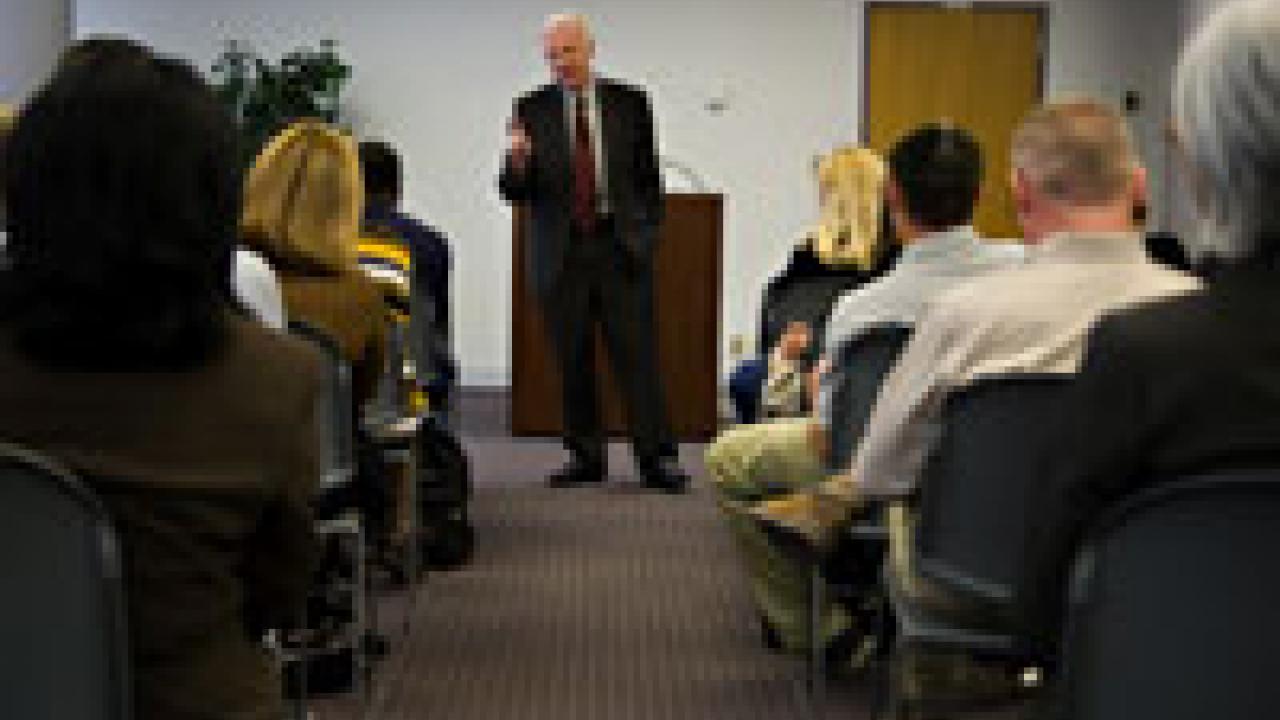Students implored Chancellor Larry Vanderhoef at a brown bag chat last week to add security lighting around campus, do more to retain students of color, and keep a careful eye on Sodexho to ensure the food service contractor treats its workers fairly under a new agreement with the university.
Vanderhoef also heard from an officer of the Coalition of University Employees, or CUE, a union that represents clerical workers. She described staff as being "in a quicksand struggle financially," and urged the chancellor to remedy the situation.
The Oct. 10 brown bag chat, Vanderhoef's first of the new academic year, drew almost 70 people to MUII in the Memorial Union. In his opening remarks, the chancellor noted how UC Davis will use a federal grant of nearly $1 million to assist all UC campuses in responding with more sensitivity to people making reports of sex assault.
UC Davis is the lead agency for this systemwide project, Vanderhoef said, because the campus has already had much success in making victims feel more comfortable about the reporting process. As a result, more of them seem to come forward at UC Davis than elsewhere: 68 last year, whereas no other UC campus reported more than 15 sex assaults in 2006.
"Now every single campus will be following Davis' lead," Vanderhoef said.
UC Davis' response is led by the Campus Violence Prevention Program. For every report, the program sends out a counselor-victim advocate and a specially trained campus police officer, who treat victims with dignity and respect, understanding and compassion, according to Jennifer Beeman, the program's director.
"I can't tell you the difference it makes," Beeman told Dateline earlier this year. "It makes an immeasurable difference."
At the brown bag chat, ASUCD Sen. Andrew Peake asserted that inadequate lighting can be a factor in sex assaults, and he asked Vanderhoef what steps would be taken to brighten the campus at night.
The chancellor said the campus responds promptly to requests for added lighting, and Vice Chancellor Stan Nosek disputed Peake's assertion that the university nixes lights where they detract from the campus's aesthetics.
"Safety always comes before aesthetics," said Nosek, who heads the Office of Administration, which includes the Buildings and Grounds division.
On the Sodexho matter, Student Affairs Associate Vice Chancellor Janet Gong said the university was working with the company in finalizing a binding memorandum that establishes improved wages and benefits for full-time Sodexho workers, and student-employee and workplace enhancements. Those benefits are laid out in a "conceptual agreement" that the university and the food service contractor announced in August. The agreement will bring Sodexho wages and benefits at or close to parity with the university's, Gong said.
The agreement stemmed from continued discussions between the university and Sodexho, in response to concerns raised by students, community members and some food service workers, in alliance with a union, for a switch in job status — from Sodexho employment to university employment.
The university, however, plans to honor its contract with Sodexho — at least until the pact expires in June 2010. For subsequent years, Gong said, the university has started reviewing a full range of options, including conversion of food service worker positions to UC employment.
In a related matter, Max Hayashi, who identified himself as a student worker in the Segundo Dining Commons, accused Sodexho of favoritism and racism in implementing the new wage increases.
But Gina Rios, retail dining services manager for Sodexho, said company policy forbids anything like what Hayashi alleged. She said Sodexho used a "straight mathematical formula" to determine the recent pay raises, and that the amounts varied depending on each employee's position on the pay scales.
Hayashi said employees feared retaliation if they spoke out. Dennis Shimek, special adviser emeritus to the chancellor, pointed out that the agreement with Sodexho includes independent, third-party review of employee complaints.
Other students questioned Vanderhoef on diversity, specifically the campus's attitude toward people of color and whether the university spends enough money on recruiting and retaining students of color.
"When you have people of color, it really expands the perspectives of all people," said Ramont Smith, a fifth-year civil engineering major.
Vanderhoef already had said much the same thing, as he restated his commitment to diversity, as expressed in the Principles of Community.
And, earlier in the meeting, Vanderhoef noted UC Davis' Reservation for College program, which aims to make the university accessible to all students, including those from educationally or economically disadvantaged areas. Nine years ago, Vanderhoef told a class of Sacramento fourth-graders that they would receive financial assistance if they stuck to an educational plan and made it into UC Davis — and this fall, five new freshmen are the fruit of that Reservation for College promise.
Sue Polley, a music department employee who is vice chair of CUE, said staff salaries are as much as 30 percent to 35 percent behind the wages paid to people in comparable positions in the Sacramento region.
Shimek, recently retired head of Human Resources at UC Davis, said he was unaware of any pay lag as high as 35 percent. The university continues to study salary inequities and is making adjustments as funds become available, he said.
Shimek and Vanderhoef pointed out that the UC Office of the President is in charge of negotiating CUE's contract with the UC system.
Media Resources
Clifton B. Parker, Dateline, (530) 752-1932, cparker@ucdavis.edu
